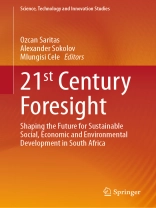Using a new methodology for foresight studies, this book presents new findings and policy recommendations to improve living conditions and make progress toward achieving the Sustainable Development Goals (SDGs). Using the case of South Africa, the respective chapters show how social and economic challenges can be addressed in an inclusive and sustainable way. The book also provides guidelines for practitioners by introducing them to cutting-edge ways of formulating Science, Technology, and Innovation (STI) policies.
The new foresight methodology uses a combination of qualitative and quantitative methods, including horizon scanning and scenario planning, as well as big data analysis, scientometric and semantic methods. The innovative approaches developed throughout the book are subsequently demonstrated using a national foresight study in South Africa. The outputs and outcomes generated by the study can be used to inform the identification and selection of priorities for the next decadal plan for STI. The book offers a valuable asset for emerging and developing economies in Africa and around the world in terms of tackling the grand challenges of the 21st century, such as water, food, energy, climate change, health and education.
Innehållsförteckning
1. Introduction: 21st Century Foresight.- Part I: Introduction to Foresight For Science, Technology and Innovation.- 2. Foresight in the 21st Century & Methodological Advancements.- 3. Foresight for Science, Technology and Innovation Policy: Relevance and Uses for Emerging Economies.- 4. Foresight methodology and commonly used methods in the new generation Foresight.- Part II: Using Foresight For Science, Technology & Innovation: The Case of South Africa.- 5. South African Foresight for STI (SAFor STI): Background, Rationales and Objectives.- 6. Research Landscape of South Africa: Current trends in research output, thematic focus, and scientific partnerships.- 7. Using Big Data for Foresight: Scientometric and Semantic Analysis for South Africa.- Part III: Science, Technology, and Innovation Domains for South Africa.- 8. The Circular Economy.- 9. Educating for 2030.- 10. Sustainable Energy.- 11. The Future of Society.- 12. Health Innovation.- 13. High-Tech Industrialization.- 14. ICTs and Smart Systems.- 15. Food Security.- 16. Water Security.- Part IV – Policy Implications.- 17. Recommendations to Consider for Future Science, Technology and Innovation Foresight Exercises in South Africa and the African Continent.
Om författaren
Ozcan Saritas is a Professor of Innovation and Strategy at the National Research University Higher School of Economics (HSE, Russia). He is the Editor-in-Chief of “Foresight” – the journal of future studies, strategic thinking, and policy (Emerald). With a Ph.D. from the “Foresight and Prospective Studies Program, ” he introduced the “Systemic Foresight Methodology”, and has produced a number of publications on the topic. Besides his research and publication activities, he designs and delivers academic and executive education courses on Foresight and Strategic Planning. He has recently co-authored a book, entitled “Foresight for Science, Technology and Innovation” published by Springer, which has become one of the key readings in the field.
Alexander Sokolov is a Professor at the National Research University Higher School of Economics (HSE, Russia) and Deputy Director of the HSE Institute for Statistical Studies and Economics of Knowledge. He is the Deputy Editor-in-Chief of the journal “Foresight and STI Governance” and a Regional Editor of the “Foresight” (Emerald). He is a member of working groups at OECD and other international organizations and is frequently on scientific boards and panels of international scientific conferences.
Mlungisi Cele is a CEO of the National Advisory Council on Innovation (NACI), which is a statutory advisory body to the South African government on Science, Technology, and Innovation (STI) matters. Dr Cele holds a Ph D in Higher Education Studies from the University of the Western Cape and an MPhil in Science and Technology Studies from Stellenbosch University. He worked as a researcher at the former University of Durban-Westville (now part of the University of Kwa Zulu Natal) and the University of the Western Cape. Dr. Cele represents South Africa in various multilateral forums and think-tanks.












